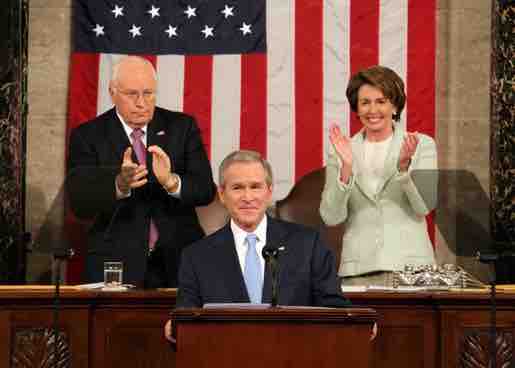Chief Legislator
The President of the United States of America is the head of state and head of government of the United States. The president leads the executive branch of the federal government and is the commander-in-chief of the United States Armed Forces.
Powers and Duties
The first power the Constitution confers upon the president is the veto. The Presentment Clause requires any bill passed by Congress to be presented to the president before it can become law. Perhaps the most important of all presidential powers is command of the United States Armed Forces as commander-in-chief. While the power to declare war is constitutionally vested in Congress, the president commands and directs the military and is responsible for planning military strategy. Congress, pursuant to the War Powers Resolution, must authorize any troop deployments longer than 60 days, although that process relies on triggering mechanisms that have never been employed, rendering it ineffectual. Additionally, Congress provides a check to presidential military power through its control over military spending and regulation.
The president is the head of the executive branch of the federal government and is constitutionally obligated to "take care that the laws be faithfully executed. " The executive branch has over four million employees, including members of the military. Presidents make numerous executive branch appointments--an incoming president may make up to 6,000 before he takes office and 8,000 more during his term. Ambassadors, members of the Cabinet, and other federal officers are all appointed by a president with the "advice and consent" of a majority of the Senate. Appointments made while the Senate is in recess are temporary and expire at the end of the next session of the Senate.
Historically, two doctrines concerning executive power have developed that enable the president to exercise executive power with a degree of autonomy. The first is executive privilege, which allows the president to withhold from disclosure any communications made directly to the president in the performance of executive duties. George Washington first claimed executive privilege when Congress requested to see Chief Justice John Jay's notes from an unpopular treaty negotiation with Great Britain. While not enshrined in the Constitution, or any other law, Washington's action created the precedent for the privilege. When Richard Nixon tried to use executive privilege as a reason for not turning over subpoenaed evidence to Congress during the Watergate scandal, the Supreme Court ruled in United States v. Nixon, 418 U.S. 683 (1974) that executive privilege did not apply in cases where a president was attempting to avoid criminal prosecution. When President Bill Clinton attempted to use executive privilege regarding the Lewinsky scandal, the Supreme Court ruled in Clinton v. Jones, 520 U.S. 681 (1997) that the privilege also could not be used in civil suits. These cases established the legal precedent that executive privilege is valid, although the exact extent of the privilege has yet to be clearly defined. Additionally, federal courts have allowed this privilege to radiate outward and protect other executive branch employees, but have weakened this protection for those executive branch communications that do not involve the president .

State of the Union 2007
A White House photo of President Bush, VP Cheney, and Speaker Pelosi at the 2007 State of the Union address. The photo has been cropped from the orginal to remove everything but the principals, the bottom stars on the flag, and the teleprompters. The caption given by the White House is: President George W. Bush receives applause while delivering the State of the Union address at the U.S. Capitol, Tuesday, January 23, 2007. Also pictured are Vice President Dick Cheney and Speaker of the House Nancy Pelosi. White House photo by David Bohrer.
Critics of Enhanced Presidency
Most of the nation's Founding Fathers expected the Congress, which was the first branch of government described in the Constitution, to be the dominant branch of government. In other words, they did not expect a strong executive. However, presidential power has shifted over time, which has resulted in claims that the modern presidency has become too powerful, unchecked, unbalanced, and "monarchist" in nature. Critic Dana D. Nelson believes presidents over the past thirty years have worked towards "undivided presidential control of the executive branch and its agencies. " She criticizes proponents of the unitary executive for expanding "the many existing uncheckable executive powers – such as executive orders, decrees, memorandums, proclamations, national security directives and legislative signing statements – that already allow presidents to enact a good deal of foreign and domestic policy without aid, interference or consent from Congress." Other scholars disagree with the view that the presidency has too much power and cite the ability of Congress and the courts to block presidential actions. As an example, the Supreme Court in 2016 overturned Pres. Obama's administrative appointment made during a Congressional recess, and is scheduled to rule on the constitutionality of an executive order know as DACA (Deferred Action for Childhood Arrivals) that delays deportation of undocumented residents who arrived as children.